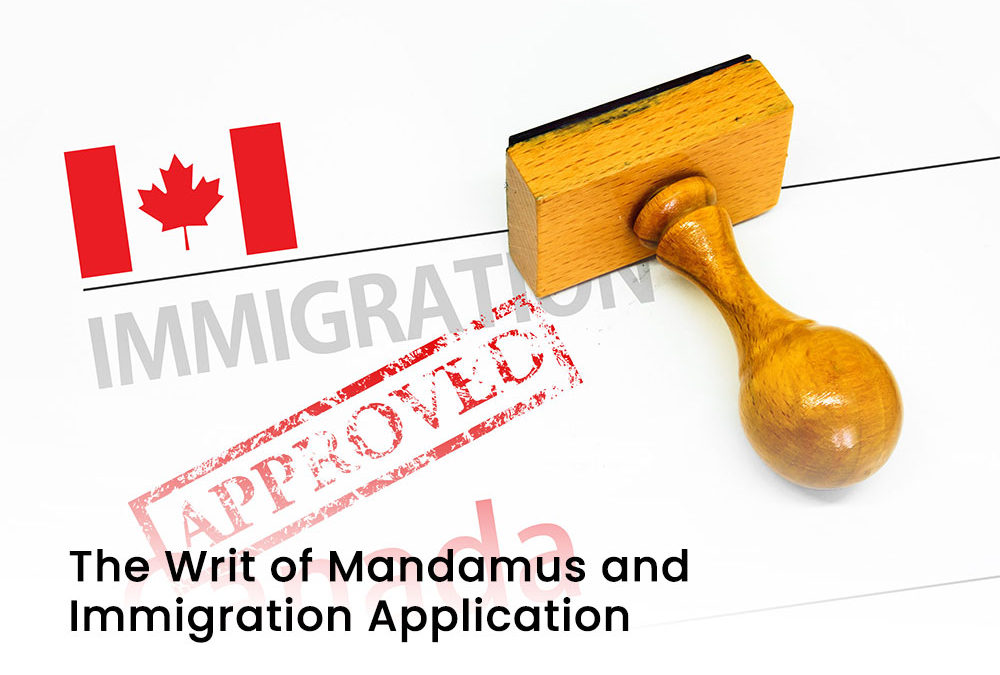When you’re waiting for an immigration application to be processed, time flies (Tempus fugit), or it ticks by extremely slowly. This is why understanding the rights you are entitled to and demanding they be enforced is needed. It isn’t unheard of for the immigration regime in Canada and its agencies, such as the Immigration, Refugees and Citizenship Canada (IRCC), to take time processing applications. Some tend to take longer than others. Due to complicating factors, complex cases, and other external factors beyond control, such as the COVID-19 pandemic, cases might not get the attention they deserve. Ex nihilo nihil fit is a popular Latin saying, “nothing comes from nothing.” So, if you want the desired results, a little extra push is needed to ensure your application reaches the finish line.
If your immigration application is pending with the IRCC and you believe it’s taking longer than usual, you have a judicial remedy at your disposal. This remedy is known as the writ of mandamus.
Free Online Canadian Immigration AssessmentWhat Is a Writ of Mandamus?
The writ of mandamus originated from ancient English law, wherein the royals issued it as official commands. In Latin, it translates to “We command.” These official commands essentially laid out the specific acts the subjects had to undertake within their expected duty, wherein their failure not to do so resulted in adverse effects. From a legal perspective, a writ of mandamus is issued by a superior court to a lower one, a public authority, or a government officer to carry out duties they are obligated to perform by law.
How Is It Relevant in Context to Immigration Applications?
A writ of mandamus is essentially used to compel the IRCC to decide on pending immigration applications. Regardless of whether it is a temporary or permanent residence visa application, this remedy can be used. Similarly, it is also a helpful remedy in matters of any delay in application processing associated with a temporary residence, such as a study or a work permit. It can also be used for applications including and not limited to matters related to citizenship, temporary residence, temporary resident permit, and criminal rehabilitation.
Instead of opting for a specific case inquiry and completing the IRCC to process the application, the writ of mandamus is a better means. The IRCC is constantly receiving a flux of case-specific inquiries. Most of them are unfortunately left unaddressed. This means most applicants are left waiting for answers which worsen the already stress-inducing delay they are dealing with. Seeking this writ at the Federal Court forces the IRCC for a prompt response.
You need not worry about any adverse actions by the IRCC upon filing this writ application with the Federal Court. It will in no way affect or hamper your immigration application processing. The rule of law is of fundamental importance in Canada. This remedy is accessible to any applicant who believes the processing of their immigration application is subjected to unreasonable delay.
Am I Eligible for This Remedy?
A few basic and specific legal requirements must be met before a court can issue a writ of mandamus. The Canadian Bar Association provides a detailed guideline about this. The primary condition determining whether you can obtain a writ of mandamus is the processing time involved. If the average processing time of an application is exceeded and the delay is unreasonable, you are eligible for using this remedy.
Awaiting the decision about your immigration application can be a source of acute anxiety and stress because it determines your future. Some delays can be unreasonable, which is an effective tool to fix this situation. However, one thing that has to be done is to ensure a reasonable amount of time for processing the application has passed, and it is beyond the average. You can check this by visiting the Canadian government’s official website.
Usually, the processing time varies from a couple of weeks to a year depending on the complexity and nature of the application. It can feel like a long-drawn-out process, and some delays are unacceptable even with the ongoing pandemic. Ensure that your immigration application is completed correctly and there are no apparent reasons why the IRCC has held it. After this, you can seek a writ of mandamus.
A wonderful thing about this remedy is anyone can seek it. It means that even those outside of Canada are eligible for this. This remedy is available for applicants who have submitted and correctly filled their immigration applications to the IRCC. Your residence or location is irrelevant when the application is filed, or the federal court considers the matter.
How Do I Apply?
All mandamus applications for immigration-related purposes are filed with the Federal Court. It starts with a persuasive yet well-presented demand letter encouraging the IRCC to investigate why an application has not been processed yet. The actual process of this writ application is based on the conventional judicial review process. The three parts of it involve filing and issuance as well as the service of the Application for Leave and Judicial Review based on a request of mandamus. The key facts associated with your case and the relief you seek will be included in the Application for Leave and Judicial Review. The prima facie case for a mandamus order must be fulfilled, while the facts must be presented briefly, clearly, and persuasively.
The COVID-19 pandemic has resulted in the disruption of specific processes. However, this step is sufficient to push the IRCC to continue or complete the processing within 30-60 days of filing. Hiring the services of an experienced Canadian immigration lawyer is the first step toward this goal.
Read to know : Importance To Hiring a Canadian Immigration Lawyer
Contact Us


